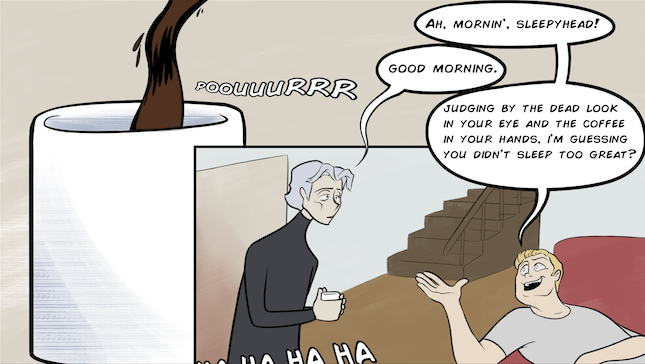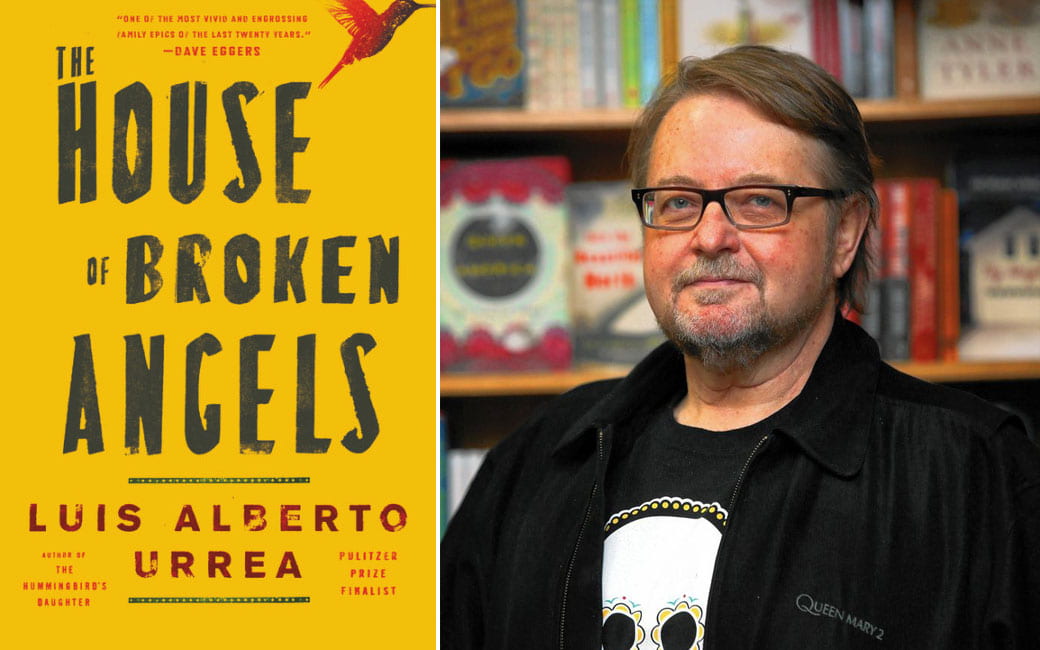The rising sun above the cityscape, tinting the polluted sky a hazy shade of pink. High-rise buildings, both old and new, loom over the smaller, less significant buildings creating a man-made mountain range that lines the inner city, divides Baltimore. A crane in the distance. Its neck outstretched, reaching upward toward an airplane, the white contrail tearing the impeccable sky apart. Standing at the bottom, beneath the great world at large, two shadows, one slightly taller than the other.
All of this captured in a single photograph April holds, by the camera her grandma Vivian — Viv, that’s what she called her — gave her years ago, long before she passed away. On the rooftop of her rowhome, once her grandma’s rowhome, she lets her feet dangle over the edge as she looks over the photograph one more time.
The photograph, despite its glossy sheen, is tacky. Ghostly fingerprints blemish the corners of the photograph she’s held many times before. How many hours have been lost studying it? She couldn’t say.
Before the photograph was taken, Viv next to her, encouraging her to simply take pictures of what she likes rather than what’s she thinks might be good, she barely remembers much of anything.
What she does remember is the quiet of the city that particular morning, how each time that quiet seemed to settle itself deep within her chest, accumulates a weight that pushes it deeper still. It’s a shock to April that her heart has room to beat beneath her sternum at all.
* * *
Living in the heart of a city, especially one so saturated in violence as Baltimore, quiet is rare, jarring, unsettling. Some view the quiet as a commodity; April sees it as an omen.
Because it doesn’t happen often, or because it isn’t often paid attention, the quiet moments stick out. They act as a divergence in her life. A point where all things changed, serving as a clear marker to the life events that have led her to the rooftop. Over time, she’s learned to be wary of the times when the city slips into these strange lulls. When the citizens become too exhausted, too worn down to play their part in the cacophony of sound the city produces. It’s in those moments that it happens.
There was quiet, or so she imagined, the night the bullet broke through her boyfriend’s belly while he walked home from work. The force of it knocked the air from his lungs, pushed his body to the ground. A second passed through his head. Murdered for Marlboro Reds and seven dollars.
After Derrick’s murder, the night terrors started. April would lay down to sleep, lights off, the quiet of night settling over her, that’s when the haunts started. The shade of a man, distorted face, a body like a blackhole that sucked the faint, flickering light from April’s chest. Emptied her of joy. Noise was the only way she could sleep. And the louder the noise, the more chaotic, the better she seemed to sleep, though she never again felt rested as did before Derrick’s absence.
Too exhausted for daily life alone, April eventually moved out of her rented apartment off Boston Street, on Linwood, and moved back into her Viv’s rowhome in Highlandtown. With open arms her grandma greeted her as April stood on the stoop, her bags dropped at her side. The bed she’d slept in as a young girl still there, covered by the Mulan bedspread. Pictures of her parents, the same ones she doesn’t remember, the same ones that died in a car accident, the car’s roof opened like a can of tuna, the truck driver still lethargic after being asleep at the wheel; he wasn’t jailed, but never drove again, were scattered around the room. Only one frame held the family as a whole: April perched on her mother’s hip, her father’s arms around both of them, smiling under his thick mustache. April was too young to grasp their absence after they died. Viv, living alone except for her cat, Earl, gladly took her granddaughter in, became her guardian, her keeper, her mother.
Photographs were scattered around the house. April walked through the living room, down the halls, and studied the small details of each one.
At a much younger age, when Viv’s father showed her how to use his camera from back when he was a photojournalist, a Zeiss Contax II, her grandma started practicing photography. Every trip she took, no matter how grand, she carried that camera with her.
In the old, unchanged room she once inhabited, she picked up the photograph her parents and her, studied it. “Get rid of this,” she said, handing it to her Viv. “Just get rid of them all. I don’t care what you do to them.”
Knowing that grief is an unbearable creature, knowing how it malleable people become, how they tend to be shaped by what isn’t being cared for, Viv obliged and removed all the photographs of her parents from the room. Carefully, Viv stacked to frames in a box, closed each flap, and watched as the smiling faces of her family fade into darkness.
It wasn’t until her grandma’s back ached terribly, her legs giving way to the hardwood floor beneath her, that April started to normalize, whatever that means. The common bodily failings a woman of ninety-two affected Viv, aged her by five more years. Hands, once steady, continually trembled.
After the second fall, April bought her a walker that Viv proudly refused to use. But by the fourth she’d agreed to the cumbersome thing, carefully maneuvering the narrow halls of her home with her fractured wrist braced.
Conversations grew longer with less being said. April would watch Viv place her left hand against her head and massage her temple with her pointer finger; she imagined the words loosening from her brain to drop on her tongue like the toys Viv used to win for April at Funcade on the Ocean City boardwalk. The pink fuzz of her tongue hangs there for a moment, licks her top lip, and slowly, meticulously, works the word from her mouth: “Pars-lee.”
“What?”
“We need more parsley,” she said. “Or is it cilantro?”
April knew what was happening, though she tried her best to ignore it. She didn’t want to acknowledge that her grandma was fading into the prison of her own mind. But it’s hard to ignore when Viv started calling her Deanna, her mother’s name. Or when she stopped pulling her underwear down to use the bathroom. Or when continually meowed and circled beneath April’s feet, hungry after not being fed the evening before, after she returned home the next morning having slept over some strange man’s house she’d met on Tinder.
“Deanna,” Viv said. “How’s Charles doing? I swear you’re going to marry that man someday. He’s sweet on you.”
Instead of correcting her, instead of imposing the reality that Deanna and Charles did marry, had a daughter, and are now dead, April replied, “He’s doing just fine, mom. He’s doing just fine.” The guilt churned around in her stomach. But was it so bad to preserve whatever joy she might have felt seeing what she thought was her daughter happily with her would-be husband? April didn’t think so. It was far better than the truth, telling her that Deanna and Charles are dead, that she’d slept with yet another man she’d only met earlier that same night, that she opened herself up, allowed him to do as he pleased, exploited herself to try to fill the hole left behind by the bullet that killed the last man she loved.
Quiet moved in her grandma passed away. Dust settled over the once-busy house; April let it gather on the windowsills, atop the photo frames mounted along the wall. She kept herself moving forward, busied herself with photography, strange men and, on one occasion, a woman, not looking at the loss lurking in the dark. Her life seemed to revert into the blur it once was–nights she spent alone, her time unoccupied, she couldn’t sleep. The ouroboros of loss continued to chase her, closed in on her. It always does.
One night, sleep deprived but unable to sleep, April heard the shuffle of footsteps down the hall, the closing and opening of a door. When she peeked around the corner, there was no one. Earl weaved between her legs, his fur soft against her bare ankles. She proceeded down the hallway, into the living room where the portraits hung; eyes all on her, watching as she moved into the dining room where her grandma would sit and enjoy a glass of whiskey. She half-expected to see her there, dressed in a white nightgown, her pastel skin aglow beneath the fluorescent light.
But there was no one. Earl jumped up and perched on the tabletop, purring. April poured herself a whiskey and sat in her grandma’s seat. She thought about reaching out to one of her many old flings. She thought about calling Cheryl, the one woman she’d found herself with weeks ago. She thought about each one, how they felt foreign despite being intimate. She thought about how Derrick used to hold her during sex, his hands clumsily gliding along her body, and how he would kiss her forehead before they fell asleep. She thought about the many memories she’d accumulated over her life thus far, how they gathered along her brain like dust on the windowsill, and how each one felt like a different life lived. And she thought about Viv, her guardian, her keeper, her grandmother-turned-mother, how she held the camera to April’s eye, steadied the frame, snapped the shot; taught her all that she knew about photography, about preserving memories. April sat at the table, her losses gathered in all in one place, and wept unlike she fell asleep, her head resting on her folded arms.
Photographs that Viv had taken over her lifetime hung on the walls. April marveled at them. People she’d never met, places she’d never been. The ghost of so many strangers crowding the paint-chip wall, memories of a life she’d never lived.
When April tried to take down particular photos, not because she didn’t like them, but rather to make room for her own life, the frame remained mounted on the wall, unmoving regardless of how much force she applied. Each one had been placed with care, bolted into the wall so that no one could change what Viv had laid out.
Sweat collected on April’s brow. She looked on at the array of faces, overwhelmed by the eyes looking at her, through her. They’d watched as she cried at the kitchen table the night before.
Cutting a length of string she’d found under an end table, in a basket with miscellaneous knitting supplies—she never knew her grandma could knit—April tied end-to-end together, forming a loop, and hung her photographs overtop those of her grandma Vivian. With each photo she added to the over-cluttered wall, their lives blended together into an amalgam of decades, becoming a portal to two different lifetimes. The place where Derrick now lives, wearing a permanent smile, among the faces of many strangers; her grandma, too.
***
Months after she’d committed to living in her grandma’s rowhome, after sorting through the rummage left behind by her deceased family, all but one box unpacked, the pain of her losses lessened, she goes through the final box marked “VIV’S THINGS.”
In it, April finds, among the assortment of shoddy knit gloves, old hats, papers covered in doodles and scribbles, Viv’s first camera; the Contax II her grandmother’s father used and had given her when she was a young girl. The metal body dented. Crevices and gears filled with dust and hair that could’ve been Viv’s, or her father’s, or someone else neither of them knew.
April held it to her right eye, closed her left, and saw the crack that spanned from side to side of the viewfinder. She panned around the room, moving from corner to corner, from high to low, looking at the wall of portraits that she covered with her own portraits of landscapes and animals and the people in pain she photographed for her college project. When she looked towards the kitchen, Earl sat atop the table. Left of the Snickers-colored cat, Viv sat. She gazed at her granddaughter, the once-young girl now grown into a woman, the very same woman who slowly became her own caretaker, and smiled. April removed the cracked viewfinder from her eye, taking her grandma with it. Earl licked between his legs, only stopping to glance at April, meowed, and carried on with his cleaning.
In that moment, April noticed the smile. It decorated her own face, even after Viv had left. It was the first time she’d smiled since grandma passed.
Baltimore is more than pain and heartbreak and loss. It must be. Since Derrick’s murder, since her grandma’s death, since she resigned herself from her former life, embarking on a new life, reborn into the old family rowhome as the last photograph was hung on the wall, she’s found a reason for the city to be much more than how it is perceived.
On Saturdays, she walks the city and takes photographs. Some of the buildings, the architecture her grandma loved. Some of people, mostly homeless—some asleep on stoops, some too high on heroin to hold their head up; some who sit on the benches, half naked, stinking and laughing, posing in gratitude of being alive.
When she walks President Street, she photographs the young black boys who endure rejection at each traffic life, their squeegees held tight in one hand, spray bottle in the other, trying and trying until that one person tells them “yes” and tips them a buck out in the oppressive summer heat. April wipes the sweat from her forehead with her free hand and watches, even after the film has run out.
These photos she takes, they are single moments that she has come to possess. By applying pressure to the button, she quietly agrees to the someone else’s keeper—a museum curator for the lives of other people, alive, dead, known and unknown.
Sometimes, after the film is developed, she sits and looks over the photographs. Reviews them for signs of life she might have missed. On occasion, in the frozen world of a photograph, when the great world ceases to spin, she finds the potential buried beneath. When she finds that potential in the photograph of the city she lives in, that’s when she knows there is much more to it than what she’s come to know.
She returns home, exhausted from the day of photography—different from the exhaustion she feels coming home from her work as an editor for a financial well-being service as she herself struggles to pay her residual student loans, her credit debt, the cost of her grandmother’s death—and she falls onto the couch and wonders why she’s in a position to edit financial advice for anyone when she just signed on to inherit the debt of Viv’s old rowhome, which is paid off but requires much work and upkeep. She raises one foot at a time up onto the couch and pulls them into her, one under the other, and retrieves a black film canister from her bag.
Each image the light burns into the strip of film is a memory. In a single plastic container, April carries roughly thirty-six of them. The actions of others permanently paused. She relishes the feeling of having control over these lives of strangers, that they are hers to own.
Some part of her desires to share them with another; hope that change can come from others seeing the potential for beauty that she sees.
The other part knows that can’t happen. It’s a fool’s errand, and she knows it.
But if there’s one thing that she’s learned over the years, it’s that sometimes a small, kind gesture is enough to alleviate great burdens. Times when we wish to give up, when the whole world’s gone dark, April knows she must push onward until the light is there, within reach.
Despite the pain she saw on Viv’s face, she watched as her grandma continued to cook and clean while April grappled with her life and loss; urged April to go out into the city, take photographs, read, learn, keep her mind occupied. Every now and again, when April felt too heavy to move, Viv grabbed her by the arm and pulled her out of bed and out the door, where they’d walk slowly through the streets of the city grew up in.
“Nothing looks like it used to,” she’d say to April. “It’s all so different.” Viv winced in pain, but April, holding her steady, helped her down the road as her grandma observed all the change, smiling—though was never certain if it was out of nostalgia or for that moment: the two of them, arm in arm. Viv started to laugh, started to curse the deficiency of her body as her nerves screamed and sent fire to her brain.
Back inside, Viv sat at the dining room table while April fetched her large, yellow pills. She’d swallow them down, along with her pride, as April went about cooking a meager meal for dinner—Easy Mac, Velveeta, or Hamburger Helper were all within reach of her culinary skills when it came to a hot meal. Stirring the thick, vicious cream that looks more plastic than cheese, April listened to the faint strain of her grandma’s breathing, felt the soft stare of admiration Viv often offered her. She loved her grandma and hated to see her suffer; wished, day and night, that there was something she could do to ease the pain.
As she bathed her, dipping the sponge in hot water before dappling it across her shoulders, along her upper back, refreshing her skin, allowing the water to trickle down—it offered Viv a small moment of relief, those delicate touches. The two women, a generation apart, met eyes, and April felt sorrow melt away as her grandma smiled, nodded, and told her, “It’s okay, dear.” With a damp hand, Viv wiped the tears from April’s eyes and rested her along her left cheek. Without thinking, April brought both her hands up and, in a small, kind gesture, embraced the single, shaking hand her grandma placed on her cheek.
In her heart, she still carries a tremendous love for who showed her how to be strong and how to be vulnerable. Showed her how to be a proud woman, to say “no,” and to carry the weight that comes with womanhood. And she showed her how to use a camera, to center the frame, introduced April to the magic of a moment and how a camera can turn a memory into a possession.
But a memory isn’t permanent, and neither is a photograph. Both can be easily destroyed. Both can be warped and altered.
Her grandma didn’t have the heart to tell her that.
The colors fade over time, lose the vividness once captured, just the same as memories lose their potency. The corners wear thin and tear. Before long, the photograph becomes a tattered scrap of paper without meaning.
Sometimes, the image, though simple, exists to be pain possessed: an image of a quiet morning in Baltimore, the pink sky torn in two by the jet plane, a frame for the shape of absence.
When April is alone, she combs through a collection of private albums from her past, removes portraits of friends and strangers from the over-cluttered wall, sifts through the memories she possesses and allows herself to sink deep into the longing that comes from each one. Eyes closed, she sits in the quiet rowhome, at the dining room table grandma Vivian always sat at and listens for the soft voice she once spoke in.
Ghosts have taken up residency along the walls of the rowhome, in the vacancy of her heart. Laughter fills the room—Derrick’s, the strangers never met, her grandma Viv’s and her pop Teddy, and most startling of all, her own. Emptiness becomes the wrinkles of her flushed cheeks as she wipes the tears from her eyes.
Vivian whispers something to her, April is sure of it. Only she can’t understand it.
The photograph she holds, Baltimore at dawn, is between her fingers. One hand moves opposite of the other. Tension is applied to the glossy paper. The white border that frames the image breaks apart. Destroys what she once possessed.
Coty Poynter is a nonfiction reader for Mud Season Review. Born and raised in Baltimore, he continues to live there with his partner, their cat Pudge, and a hodgepodge of plants. His work has appeared in Black Fox Literary Magazine, Equinox, Grub Street, and Underwood Press. His second collection of poetry, Delirium: Collected Poems, was published in October 2018 by Bowen Press.









